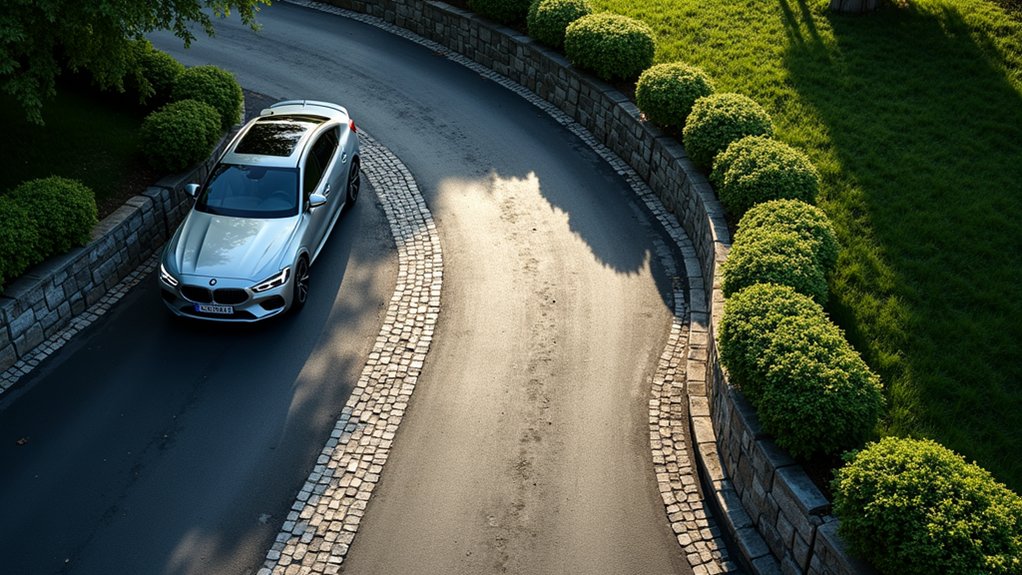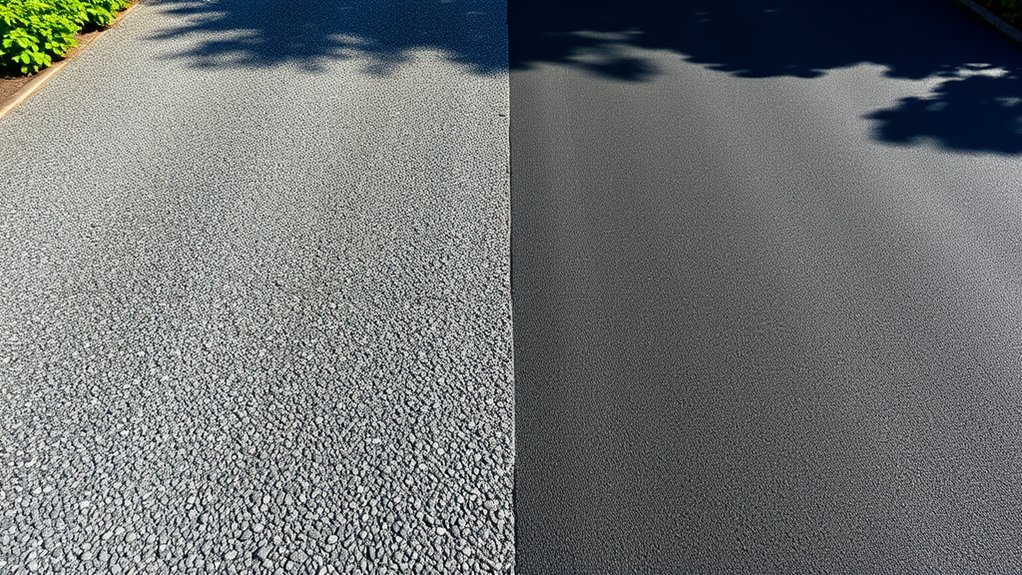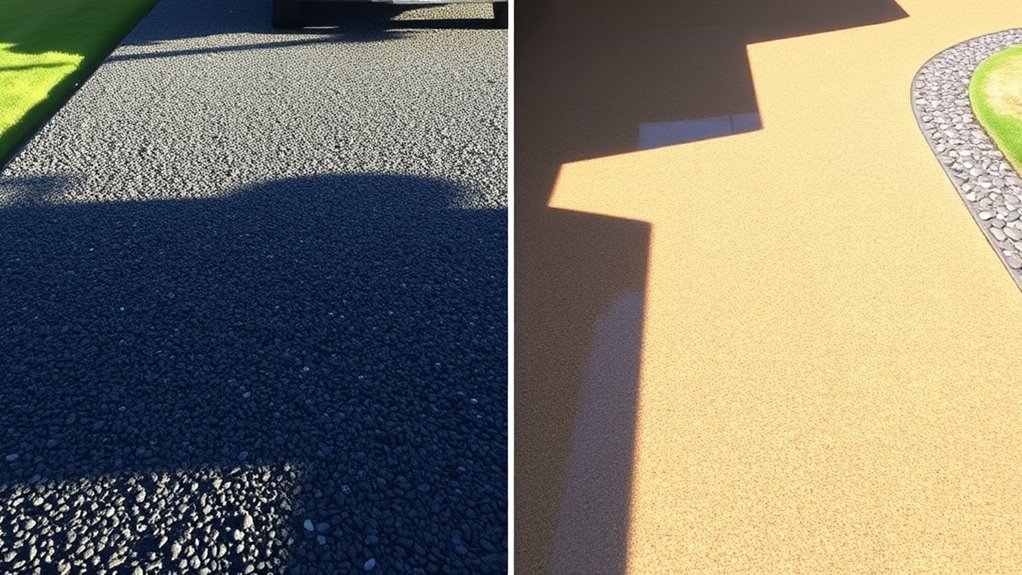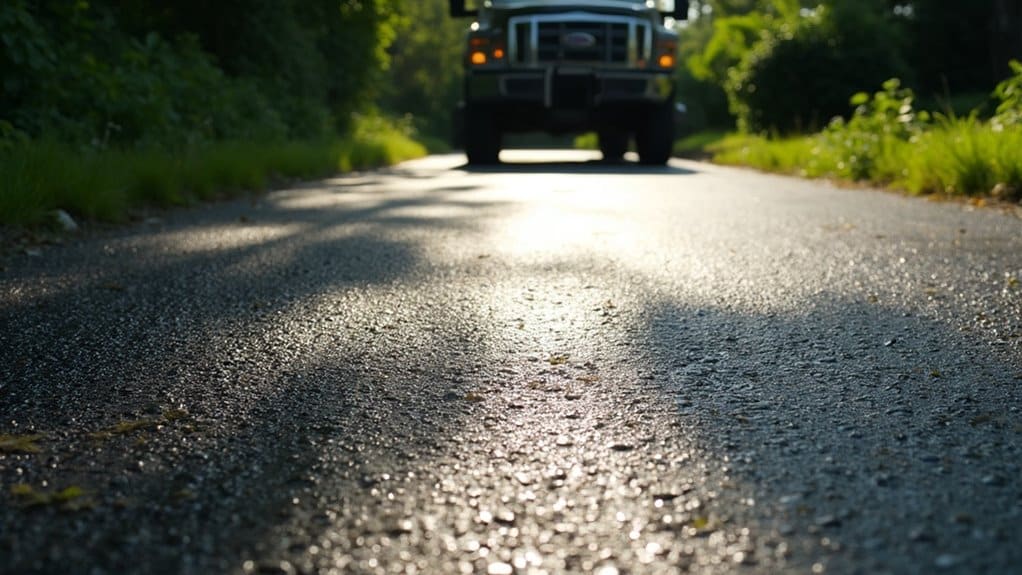When selecting the best material for a sloped driveway, asphalt is often a top choice due to its affordability and excellent grip. It offers good drainage and can be adjusted to suit different gradients, ensuring safety. Concrete, while strong, may crack under stress and requires careful installation to handle temperature changes. Gravel is a budget-friendly option that drains well but may need regular upkeep. Each material has its advantages and disadvantages, so consider your specific requirements for the best result.
Table of Contents
ToggleKey Takeaways
- Asphalt is a cost-effective option that provides excellent grip on steep slopes, making it a sensible choice for sloped driveways.
- Concrete is durable but can crack on slopes due to temperature changes and the weight of vehicles.
- Gravel is low-maintenance and drains well, but heavy rain can wash it away, necessitating repairs and thoughtful design for stability.
- Paving stones offer aesthetic appeal and easy repairs but require careful grading to function effectively on slopes.
- Resin-bound surfacing provides good traction and requires little maintenance, though it tends to have a higher installation cost and is less commonly used for driveways.
Overview of Driveway Materials for Sloped Surfaces
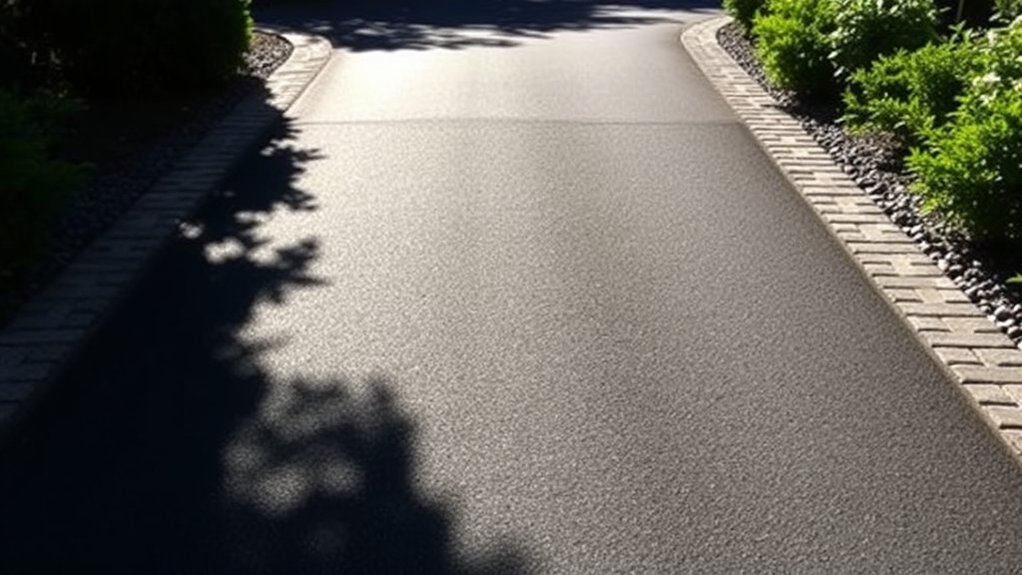
When selecting a driveway material for sloped surfaces, consider factors such as drainage, durability, and ease of installation. Gravel is a cost-effective option that provides excellent drainage and stability, though it does require regular upkeep. Concrete is durable and can be customised to fit your aesthetic, but it may crack under pressure and typically comes with a higher installation cost. Paving stones offer a variety of styles and are easy to repair, but they need precise grading to ensure proper drainage. Resin-bound surfacing provides excellent grip and low maintenance, making it suitable for steep slopes, though it tends to be more expensive. Additionally, resin surfaces are resistant to cracking, enhancing their durability on sloped areas. Proper drainage is essential to enhance the longevity of your chosen driveway material. Each material has its advantages and disadvantages, so assess your specific needs before making a decision.
Advantages of Asphalt for Sloped Driveways
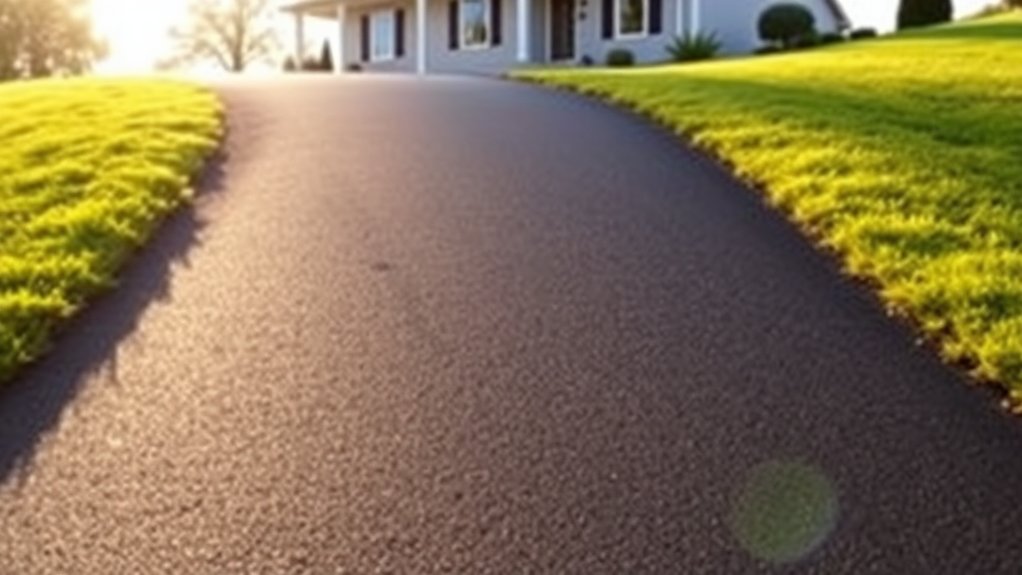
When considering a sloped driveway, asphalt is a cost-effective option. It offers lower installation costs and requires less maintenance over time, making it a practical choice. Moreover, asphalt provides excellent traction, which is crucial for safety on steep gradients, ensuring a reliable grip in various weather conditions. Additionally, its drainage capabilities help mitigate the risk of slippery surfaces during adverse weather. Proper site assessment before installation is essential to ensure effective drainage and long-lasting performance.
Cost-Effective Installation Options
When considering materials for sloped driveways, asphalt is a budget-friendly option that offers a good balance of cost and performance. Installation typically costs between £30 and £80 per square metre, making it more affordable than alternatives like concrete or brick. Asphalt’s durability means you’ll spend less on repairs and maintenance in the long run. Its installation can be tailored to different slopes, which adds to its resilience. Additionally, asphalt’s lifespan can range from 12 to 35 years with proper maintenance, further enhancing its value. To get the most value from asphalt, proper site preparation and a good drainage system are crucial. Regular inspections can also help identify early signs of wear or damage, ensuring the longevity of your driveway. While it mightn’t boost property values as much as some other materials, its practicality and lower initial costs make asphalt a sensible choice for homeowners seeking a long-lasting driveway solution.
Excellent Traction Performance
When considering cost-effective installation options for sloped driveways, it’s crucial to understand how material choice affects performance, especially traction.
Asphalt stands out for its excellent grip due to its naturally rough surface texture, which enhances tyre traction on inclines. Its flexible nature helps maintain durability, reducing the likelihood of cracking that can lead to slips.
With coarse aggregates, asphalt offers superior skid resistance, making it ideal for sloped surfaces. Properly designed slopes also promote effective water runoff, helping to prevent slippery conditions.
Moreover, asphalt’s ductility allows it to endure stress without breaking, ensuring reliable traction even with temperature fluctuations. Regular maintenance, such as sealcoating, helps retain its rough surface, further boosting traction performance over time.
Disadvantages of Asphalt on Slopes
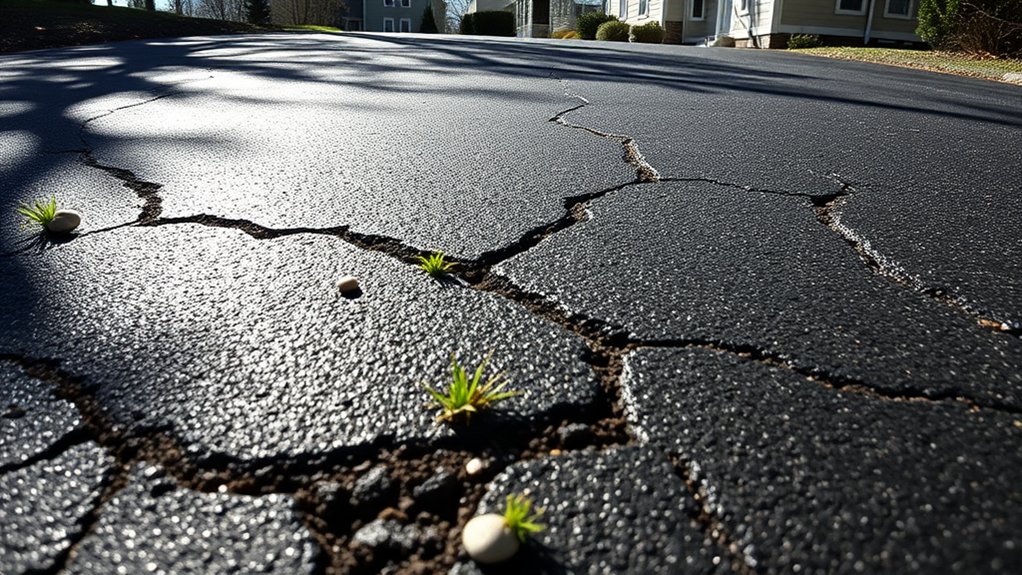
When considering asphalt for your sloped driveway, it’s important to note that it can crack over time due to the stress from gravity and vehicle movement.
These cracks not only compromise the surface but also lead to increased maintenance, as you’ll need to deal with erosion and frequent repairs.
Ultimately, the combination of cracking and ongoing upkeep can reduce the lifespan of your asphalt driveway.
Cracking Over Time
As asphalt driveways age, particularly on slopes, they become more prone to cracking due to gravitational stress and environmental factors.
Steeper slopes increase the gravitational forces, putting more strain on the asphalt, especially with heavy traffic. High temperatures can worsen top-down cracking, while poor drainage leads to water pooling, which can cause damage during freeze-thaw cycles.
If the asphalt mixture is of low quality or has too many air voids, its durability is further compromised. To help prevent cracking, consider using thicker layers and ensuring proper compaction during installation.
However, the nature of asphalt means it’s less durable on slopes, often leading to more frequent repairs or replacements over time.
Maintenance Requirements
Maintaining an asphalt driveway on a slope requires careful attention due to the challenges the incline presents. The additional wear from vehicle traction can lead to quicker surface deterioration, causing issues like rutting and grooves.
To manage water accumulation and reduce erosion risk, consider slope stabilisation techniques and effective drainage solutions, such as installing French drains or retaining walls.
Seasonal maintenance is crucial, particularly in winter, to prevent traction loss and freeze-thaw damage. Regular inspections and repairs will be necessary, which can increase your labour and material costs.
Be prepared to frequently seal the surface, fill cracks, and maintain drainage systems to extend the driveway’s lifespan; ongoing upkeep is vital for sloped asphalt driveways.
Benefits of Concrete for Steep Driveways
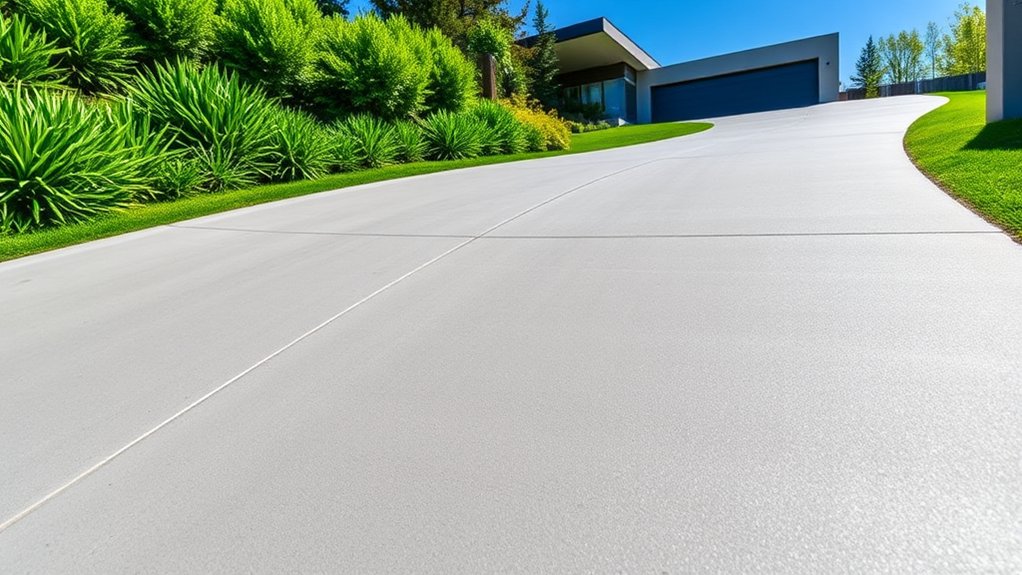
Choosing concrete for a steep driveway comes with several benefits that improve both functionality and safety. Its durability ensures it withstands heavy wear and tear, making it long-lasting even in harsh conditions.
The textured finishes of concrete provide excellent grip, crucial for preventing slips on steep slopes, and its slip resistance enhances safety during wet or icy weather.
Concrete is also low maintenance, which can save you money over time and reduce your environmental impact. It handles seasonal changes well, with formulations designed to cope with temperature variations and freeze-thaw cycles.
Furthermore, the precise grading of concrete effectively manages water runoff, helping to prevent erosion and damage to your driveway.
With a range of aesthetic options available, concrete not only meets practical needs but also enhances the overall appearance of your property.
Limitations of Concrete in Sloped Applications
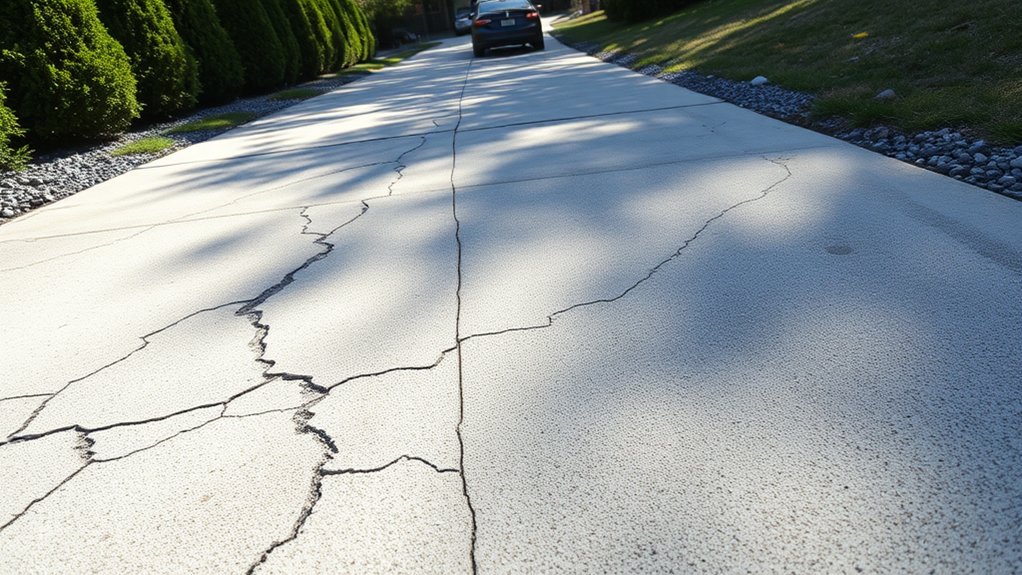
When considering concrete for sloped driveways, there are notable limitations that can impact its performance.
The risk of cracking increases on steep gradients, and temperature changes can worsen these problems.
Furthermore, installation costs may escalate due to the need for specialised techniques and materials to ensure a long-lasting surface.
Vulnerability to Cracking
Concrete is a commonly used material for driveways, but its susceptibility to cracking on sloped surfaces can create significant issues. As moisture evaporates during the curing process, the concrete shrinks, increasing the risk of cracks.
Sloped driveways are especially prone to uneven settlement, which exacerbates these cracking problems. Water can seep into joints, weakening the edges and causing expansion cracks.
While control joints can help prevent cracking, their effectiveness is reduced on slopes due to movement and improper placement.
Reinforcement, such as steel mesh, can hold cracks together but won’t stop them from forming, particularly if not installed correctly.
To improve the durability of your driveway, ensuring proper compaction and drainage on slopes is crucial, as these factors significantly impact the likelihood of cracking over time.
Temperature Sensitivity Issues
Concrete’s susceptibility to cracking on sloped driveways isn’t just due to moisture; temperature sensitivity is another key issue. Fluctuations in temperature cause concrete to expand in heat and contract in cold, leading to stress that can compromise its durability.
Sloped surfaces are particularly affected, as they experience uneven temperature effects, raising the risk of warping or deformation. This exposure speeds up deterioration, which means regular upkeep is essential.
For better resistance against temperature-related issues, using high-strength concrete with a minimum of 32 MPa is advisable. Additionally, intense heat and prolonged UV exposure can weaken sloped concrete, so considering protective measures like UV-resistant sealers is important.
Understanding these temperature sensitivity issues is vital for ensuring the longevity of your sloped driveway.
Installation Cost Factors
When considering the installation of a sloped concrete driveway, it’s important to grasp the various cost factors involved. Certain elements can significantly affect your budget, such as drainage problems or the need for additional reinforcement. Installing on a slope comes with its own challenges, often requiring specialised equipment and skilled labour.
| Cost Factor | Description | Estimated Cost |
|---|---|---|
| Site Preparation | Grading and excavation requirements | £400 – £1,600 |
| Reinforcement Needs | Rebar for added stability | £150 – £400 |
| Specialised Equipment | Tools for safe installation | £250 – £600 |
These factors can push your overall costs higher, so it’s crucial to plan accordingly.
Gravel Options for Sloped Driveways
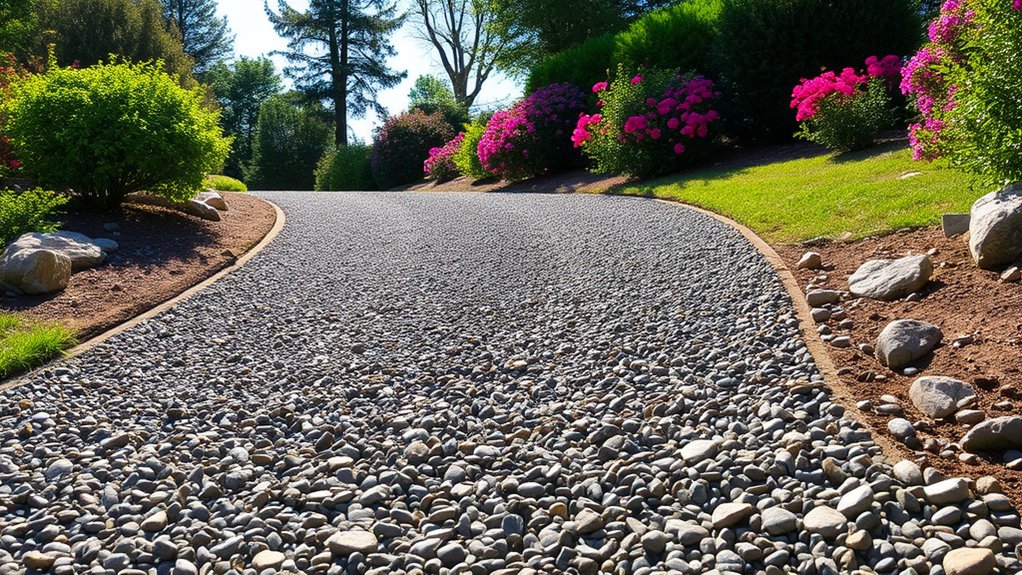
When choosing gravel for a sloped driveway, it’s important to consider the specific challenges of the incline. Different types of gravel can affect stability and maintenance significantly.
Crushed stone is a common option as it interlocks well, providing better stability. Pea gravel has a smooth finish but can shift without proper support. Decomposed granite compacts effectively, making it suitable for the top layer.
While river rock looks attractive, it may not offer the stability needed. Crusher run, a blend of stone dust and small stones, is great for preventing movement.
Always factor in drainage and regular upkeep to tackle slope issues. Selecting the right gravel can enhance both the functionality and appearance of your sloped driveway.
Pros and Cons of Using Gravel
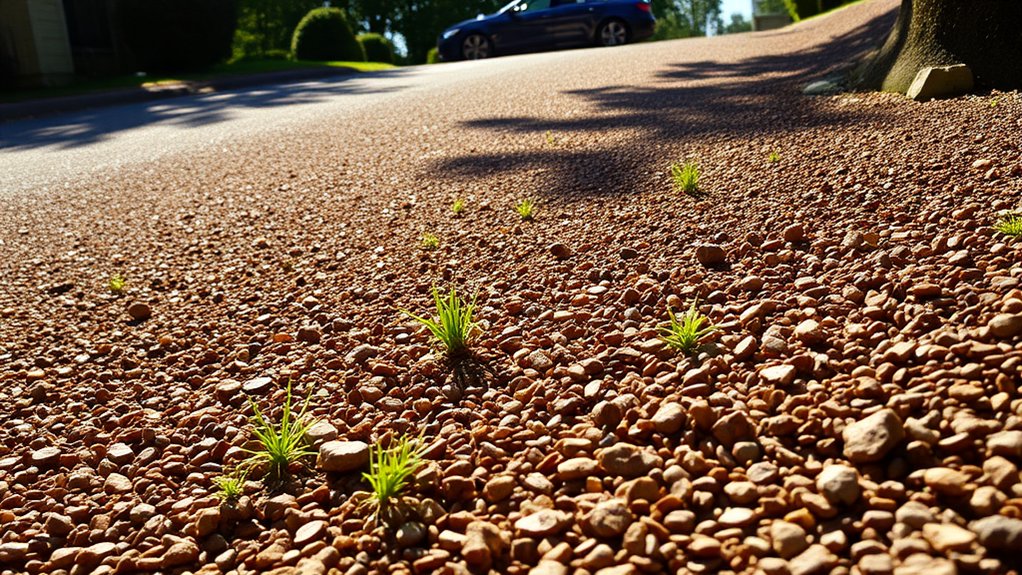
Choosing gravel for a sloped driveway has its fair share of pros and cons to consider.
On the positive side, gravel is cost-effective and low-maintenance, making it an attractive option. It allows for good drainage, helping to prevent puddles and reducing the risk of erosion. Crushed gravel also offers great traction and stability, which can minimise slippage.
However, there are downsides to be aware of. Heavy rain can wash gravel away, leading to expensive repairs. You might also encounter issues with potholes and weed growth, necessitating regular upkeep.
Furthermore, snow removal can be tricky due to the loose material. Weigh these advantages and disadvantages carefully to decide if gravel is the right choice for your driveway.
Resin-Bound Surfacing: A Modern Solution
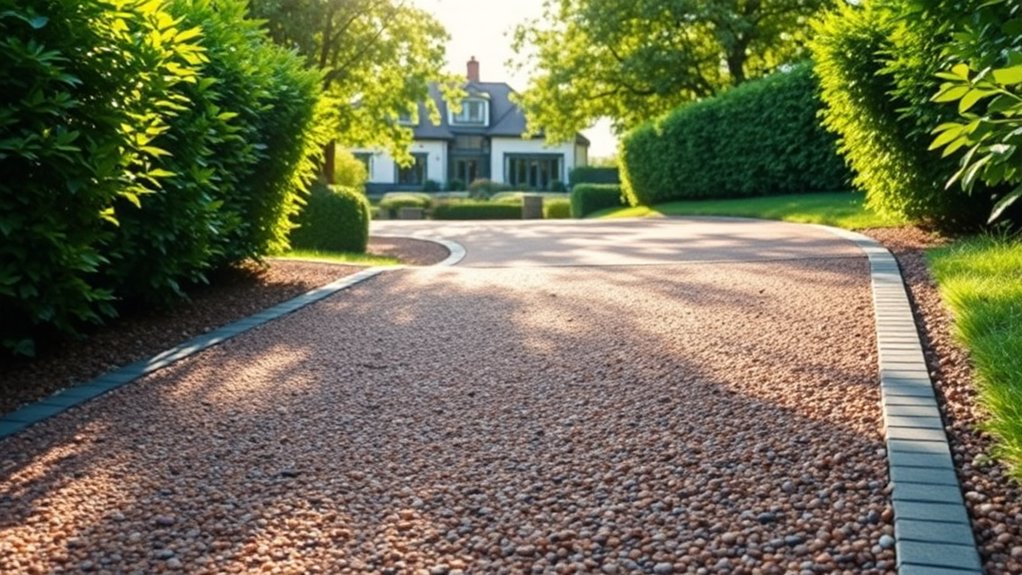
Resin-bound surfacing is a highly effective solution for sloped driveways, merging practicality with visual appeal. This modern material boasts several advantages, such as permeability for drainage, slip resistance for safety, and durability against heavy use. However, there are installation challenges to keep in mind. Proper sub-base preparation and specific resin formulations are essential for ensuring stability on slopes.
| Feature | Benefits | Considerations |
|---|---|---|
| Permeability | Reduces runoff | Needs a proper base |
| Slip Resistance | Improves safety | Requires manual application |
| Durability | Withstands harsh conditions | Needs expert installation |
| Aesthetic Appeal | Custom designs available | Careful finishing required |
| Low Maintenance | Resists weed growth | Regular cleaning necessary |
Opting for resin-bound surfacing ensures a stylish, safe, and practical driveway solution.
Maintenance Needs for Different Driveway Materials
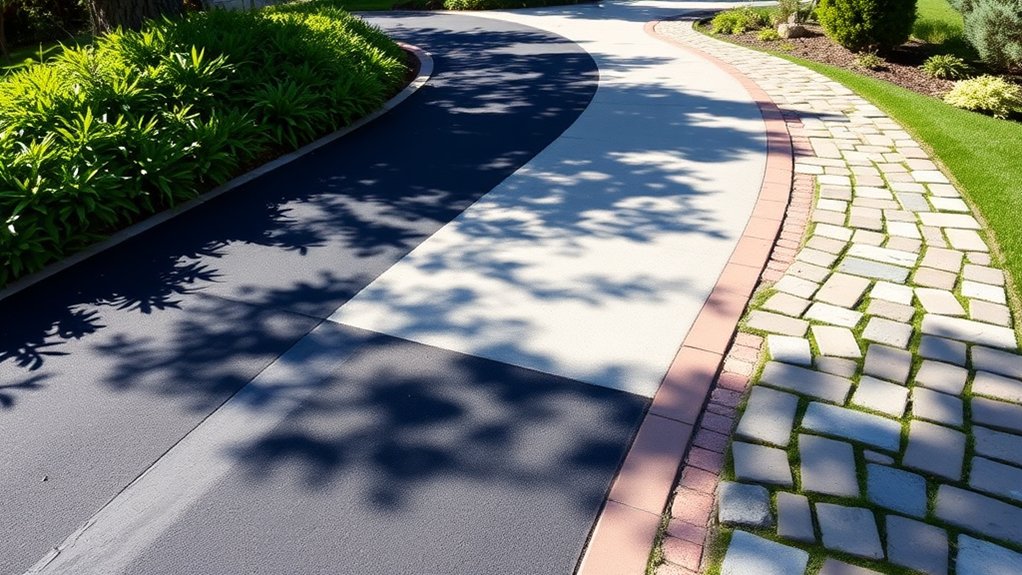
Maintaining a driveway, particularly on a slope, requires careful attention to ensure safety and longevity.
Different materials have distinct maintenance requirements that can affect both the lifespan and traction of the surface.
Here are some essential maintenance tasks:
- Regular Inspections: Routinely check for cracks or damage to ensure safety.
- Drainage Systems: Install proper drainage to avoid water build-up and erosion.
- Sealing: Apply sealants every 3-5 years to protect against weather damage and increase lifespan.
- Debris Clearance: Keep surfaces and drainage systems clear of debris to maintain traction and prevent damage.
Aesthetic Appeal of Various Driveway Options
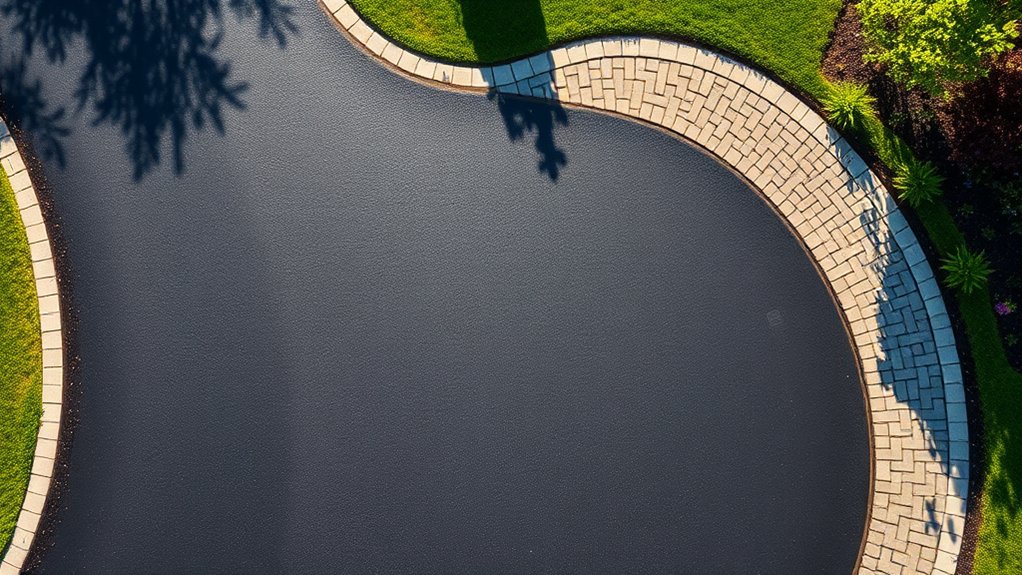
When choosing a driveway material, it’s important to consider both functionality and visual appeal, as the right choice can enhance your property’s overall look.
Asphalt provides a smooth, uniform finish but has limited colour options that may not fit every design.
In contrast, concrete offers a variety of colours and finishes, including polished and stamped options, making it suitable for modern styles.
Crushed gravel and pea gravel bring a rustic charm with their natural textures and earthy hues, perfect for blending into countryside settings.
Lastly, permeable geometric designs provide a touch of luxury through unique patterns and eco-friendly materials, appealing to contemporary tastes while being environmentally conscious.
Cost Comparisons Among Driveway Materials
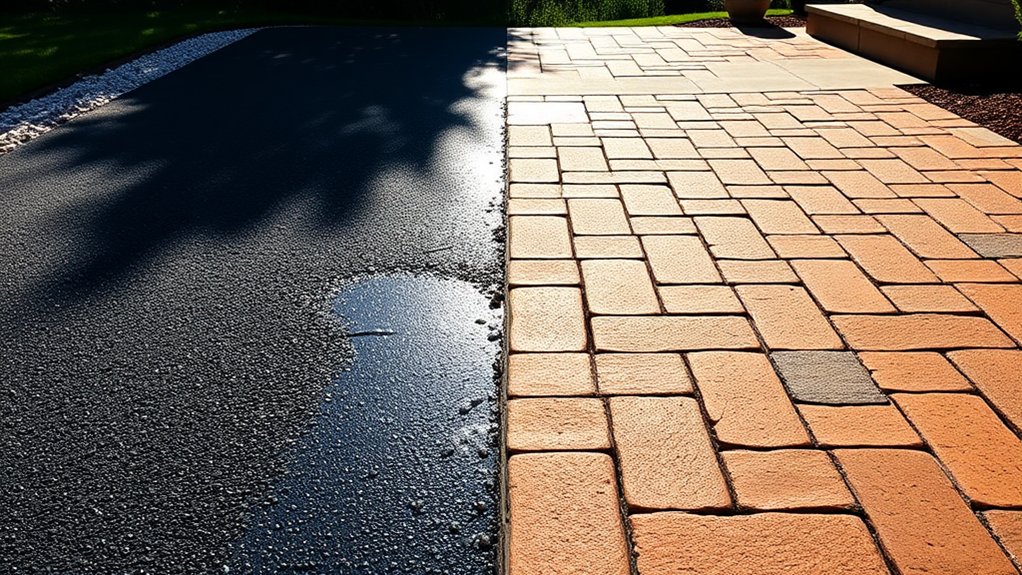
When evaluating the cost of driveway materials, you’ll notice a considerable range that can affect your budget.
Here’s a straightforward breakdown:
- Gravel: £1–£3 per square foot; low installation costs and minimal maintenance required.
- Asphalt: £3–£15 per square foot; moderate costs, lasting around 15–30 years.
- Concrete: £4–£15 per square foot; higher installation costs with a lifespan of 20–40 years.
- Pavers: £10–£30 per square foot; the most expensive option due to labour, but can last for decades.
Understanding these costs will help you make an informed choice based on your budget and how long you expect the material to last.
Choosing the Right Material for Your Driveway
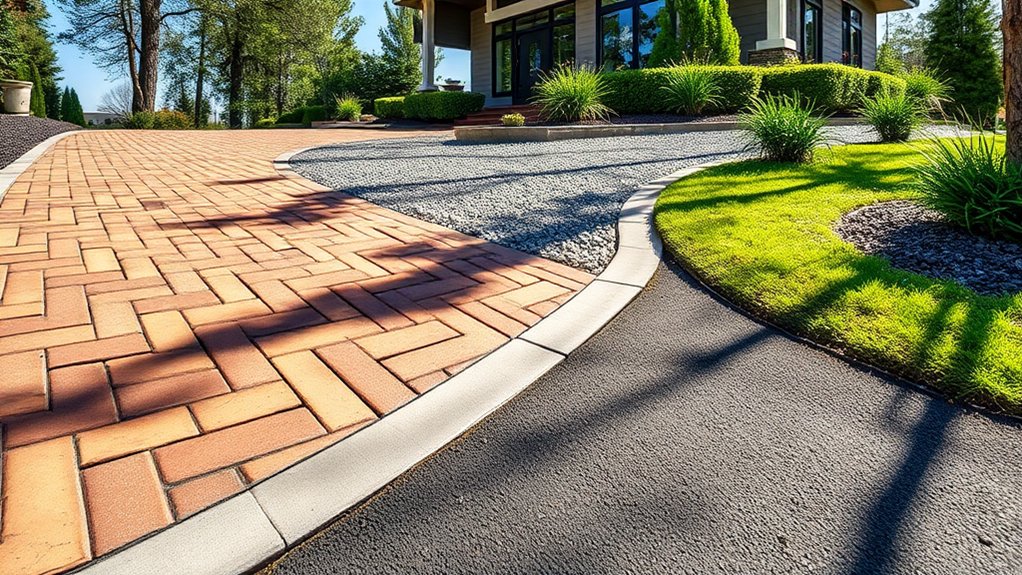
Choosing the Right Material for Your Driveway
Understanding the cost differences among driveway materials is just the start; it’s crucial to select the right one for your sloped driveway. Think about factors like traction, durability, and appearance.
| Material | Key Benefits |
|---|---|
| Crushed Gravel | Excellent traction, prevents slippage |
| Asphalt | Strong traction, ideal for steep slopes |
| Concrete | Durable, non-slip finish for safety |
| Resin-Bound Surfacing | Slip-resistant, low maintenance, stylish |
For effective drainage and a pleasing look, crushed gravel is great for steep slopes, while resin-bound surfacing adds a contemporary touch. Asphalt and concrete offer dependable traction and longevity. By making an informed choice, you’ll ensure safety and enhance your driveway’s visual appeal.
Frequently Asked Questions
How Do Weather Conditions Affect Driveway Material Performance?
Weather conditions significantly affect the durability of driveway materials. For instance, asphalt can crack in cold temperatures, while concrete may suffer from shifting due to temperature fluctuations. Heavy rain can erode gravel driveways, and paving stones might become dislodged. It’s essential to consider these factors before choosing a material for your driveway.
What Is the Installation Process for Each Driveway Material?
Installing a driveway is akin to creating a work of art; each material requires specific techniques to ensure it stands the test of time. From excavation to the final touches, every step is crucial for a stable, durable surface.
For example, when laying a block paving driveway, you’ll start by excavating the area to the required depth, then create a solid base using sharp sand or gravel. The blocks are meticulously arranged, and once laid, you’ll need to compact them and fill the joints with sand to prevent movement.
In contrast, tarmac driveways involve a different approach. You’ll need to excavate, lay a sub-base of crushed stone, then apply a layer of hot asphalt, which is rolled and smoothed for a professional finish.
Can I DIY My Sloped Driveway Installation?
You can install a sloped driveway yourself, but be sure to consider the slope carefully. Make sure to prioritise proper drainage and traction. For ease, materials like gravel are a good option, while asphalt and concrete may need more advanced skills.
How Do I Choose the Right Color for My Driveway?
Imagine stepping onto a driveway that beautifully matches your home’s exterior. Think about the psychology of colour to create the right mood and ensure it blends well with the surroundings. Opt for shades that complement your architecture for a cohesive and welcoming look. For instance, a classic grey or warm beige can enhance traditional homes, while bold colours might suit modern designs.
What Are the Environmental Impacts of Each Driveway Material?
When selecting driveway materials, it’s important to consider their environmental impact. Concrete has a significant carbon footprint due to its production process. Asphalt, being petroleum-based, raises concerns about resource sustainability. Gravel, while popular, can cause erosion that negatively affects local waterways. Recycling options for these materials can help reduce their environmental effects and promote a more eco-friendly choice.
Conclusion
When choosing the best material for a sloped driveway, it’s important to consider the advantages and disadvantages of each option. Asphalt is flexible and can handle temperature changes well, while concrete is known for its durability. Prioritise safety and functionality in your decision-making. The right material can significantly impact your driveway’s performance. Take time to evaluate your needs, local weather conditions, and budget to ensure you select a driveway solution that lasts and performs effectively.
Beneath the surface of tarmac and asphalt driveways lies a world of differences; discover which option suits your needs best.
Choosing between a tarmac and resin driveway can be challenging; discover the key factors that could influence your decision.
Tarmac driveways can support impressive weights, but understanding the key factors will help you determine just how much yours can Read more

